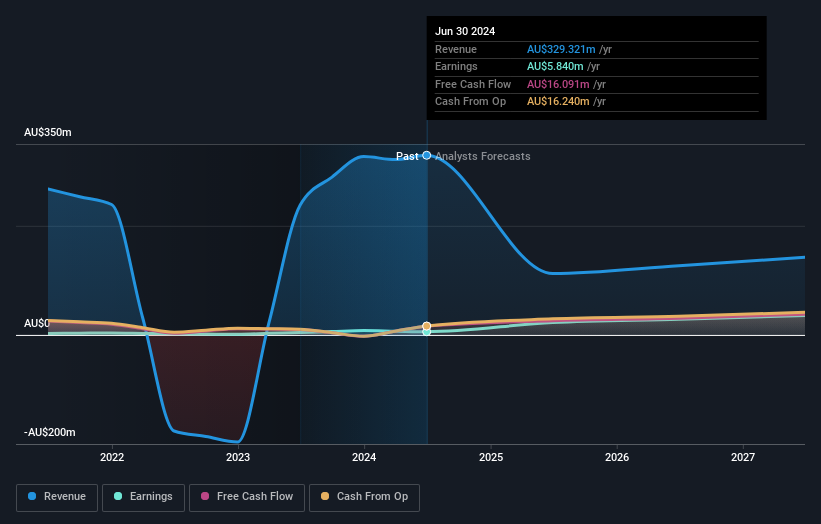Individual investors invested in Generation Development Group Limited (ASX:GDG) up 11% last week, insiders too were rewarded

Key Insights
- Significant control over Generation Development Group by individual investors implies that the general public has more power to influence management and governance-related decisions
- A total of 22 investors have a majority stake in the company with 41% ownership
- Insiders have been selling lately
A look at the shareholders of Generation Development Group Limited (ASX:GDG) can tell us which group is most powerful. With 59% stake, individual investors possess the maximum shares in the company. That is, the group stands to benefit the most if the stock rises (or lose the most if there is a downturn).
While individual investors were the group that reaped the most benefits after last week’s 11% price gain, insiders also received a 23% cut.
Let's delve deeper into each type of owner of Generation Development Group, beginning with the chart below.
View our latest analysis for Generation Development Group

What Does The Institutional Ownership Tell Us About Generation Development Group?
Institutional investors commonly compare their own returns to the returns of a commonly followed index. So they generally do consider buying larger companies that are included in the relevant benchmark index.
We can see that Generation Development Group does have institutional investors; and they hold a good portion of the company's stock. This implies the analysts working for those institutions have looked at the stock and they like it. But just like anyone else, they could be wrong. When multiple institutions own a stock, there's always a risk that they are in a 'crowded trade'. When such a trade goes wrong, multiple parties may compete to sell stock fast. This risk is higher in a company without a history of growth. You can see Generation Development Group's historic earnings and revenue below, but keep in mind there's always more to the story.

Generation Development Group is not owned by hedge funds. Our data shows that River Capital Pty Ltd. is the largest shareholder with 8.7% of shares outstanding. Meanwhile, the second and third largest shareholders, hold 5.1% and 4.9%, of the shares outstanding, respectively.
A deeper look at our ownership data shows that the top 22 shareholders collectively hold less than half of the register, suggesting a large group of small holders where no single shareholder has a majority.
Researching institutional ownership is a good way to gauge and filter a stock's expected performance. The same can be achieved by studying analyst sentiments. There is some analyst coverage of the stock, but it could still become more well known, with time.
Insider Ownership Of Generation Development Group
The definition of company insiders can be subjective and does vary between jurisdictions. Our data reflects individual insiders, capturing board members at the very least. Management ultimately answers to the board. However, it is not uncommon for managers to be executive board members, especially if they are a founder or the CEO.
Insider ownership is positive when it signals leadership are thinking like the true owners of the company. However, high insider ownership can also give immense power to a small group within the company. This can be negative in some circumstances.
It seems insiders own a significant proportion of Generation Development Group Limited. Insiders have a AU$199m stake in this AU$856m business. It is great to see insiders so invested in the business. It might be worth checking if those insiders have been buying recently.
General Public Ownership
The general public, mostly comprising of individual investors, collectively holds 59% of Generation Development Group shares. With this amount of ownership, retail investors can collectively play a role in decisions that affect shareholder returns, such as dividend policies and the appointment of directors. They can also exercise the power to vote on acquisitions or mergers that may not improve profitability.
Next Steps:
I find it very interesting to look at who exactly owns a company. But to truly gain insight, we need to consider other information, too. Case in point: We've spotted 2 warning signs for Generation Development Group you should be aware of, and 1 of them makes us a bit uncomfortable.
If you would prefer discover what analysts are predicting in terms of future growth, do not miss this free report on analyst forecasts.
NB: Figures in this article are calculated using data from the last twelve months, which refer to the 12-month period ending on the last date of the month the financial statement is dated. This may not be consistent with full year annual report figures.
New: Manage All Your Stock Portfolios in One Place
We've created the ultimate portfolio companion for stock investors, and it's free.
• Connect an unlimited number of Portfolios and see your total in one currency
• Be alerted to new Warning Signs or Risks via email or mobile
• Track the Fair Value of your stocks
Have feedback on this article? Concerned about the content? Get in touch with us directly. Alternatively, email editorial-team (at) simplywallst.com.
This article by Simply Wall St is general in nature. We provide commentary based on historical data and analyst forecasts only using an unbiased methodology and our articles are not intended to be financial advice. It does not constitute a recommendation to buy or sell any stock, and does not take account of your objectives, or your financial situation. We aim to bring you long-term focused analysis driven by fundamental data. Note that our analysis may not factor in the latest price-sensitive company announcements or qualitative material. Simply Wall St has no position in any stocks mentioned.
About ASX:GDG
Generation Development Group
Engages in the marketing and management of life insurance and life investment products and services in Australia.
Flawless balance sheet with proven track record.

